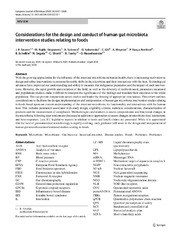Приказ основних података о документу
Considerations for the design and conduct of human gut microbiota intervention studies relating to foods
| dc.creator | Swann, J. R. | |
| dc.creator | Rajilić-Stojanović, Mirjana | |
| dc.creator | Salonen, Anne | |
| dc.creator | Sakwinska, O. | |
| dc.creator | Gill, C. | |
| dc.creator | Meynier, A. | |
| dc.creator | Fanca-Berthon, P. | |
| dc.creator | Schelkle, B. | |
| dc.creator | Segata, N. | |
| dc.creator | Shortt, C. | |
| dc.creator | Tuohy, K. | |
| dc.creator | Hasselwander, O. | |
| dc.date.accessioned | 2021-03-10T14:21:07Z | |
| dc.date.available | 2021-03-10T14:21:07Z | |
| dc.date.issued | 2020 | |
| dc.identifier.issn | 1436-6207 | |
| dc.identifier.uri | http://TechnoRep.tmf.bg.ac.rs/handle/123456789/4473 | |
| dc.description.abstract | With the growing appreciation for the influence of the intestinal microbiota on human health, there is increasing motivation to design and refine interventions to promote favorable shifts in the microbiota and their interactions with the host. Technological advances have improved our understanding and ability to measure this indigenous population and the impact of such interventions. However, the rapid growth and evolution of the field, as well as the diversity of methods used, parameters measured and populations studied, make it difficult to interpret the significance of the findings and translate their outcomes to the wider population. This can prevent comparisons across studies and hinder the drawing of appropriate conclusions. This review outlines considerations to facilitate the design, implementation and interpretation of human gut microbiota intervention studies relating to foods based upon our current understanding of the intestinal microbiota, its functionality and interactions with the human host. This includes parameters associated with study design, eligibility criteria, statistical considerations, characterization of products and the measurement of compliance. Methodologies and markers to assess compositional and functional changes in the microbiota, following interventions are discussed in addition to approaches to assess changes in microbiota-host interactions and host responses. Last, EU legislative aspects in relation to foods and health claims are presented. While it is appreciated that the field of gastrointestinal microbiology is rapidly evolving, such guidance will assist in the design and interpretation of human gut microbiota interventional studies relating to foods. | en |
| dc.publisher | Springer Heidelberg, Heidelberg | |
| dc.rights | openAccess | |
| dc.source | European Journal of Nutrition | |
| dc.subject | Microbiota | en |
| dc.subject | Microbiome | en |
| dc.subject | Gut bacteria | en |
| dc.subject | Intestinal microbes | en |
| dc.subject | Human studies | en |
| dc.subject | Foods | en |
| dc.subject | Prebiotics | en |
| dc.subject | Probiotics | en |
| dc.title | Considerations for the design and conduct of human gut microbiota intervention studies relating to foods | en |
| dc.type | article | |
| dc.rights.license | ARR | |
| dc.citation.epage | 3368 | |
| dc.citation.issue | 8 | |
| dc.citation.other | 59(8): 3347-3368 | |
| dc.citation.rank | M21 | |
| dc.citation.spage | 3347 | |
| dc.citation.volume | 59 | |
| dc.identifier.doi | 10.1007/s00394-020-02232-1 | |
| dc.identifier.fulltext | http://TechnoRep.tmf.bg.ac.rs/bitstream/id/10208/Swann2020_Article_ConsiderationsForTheDesignAndC.pdf | |
| dc.identifier.pmid | 32246263 | |
| dc.identifier.scopus | 2-s2.0-85083279259 | |
| dc.identifier.wos | 000523112300003 | |
| dc.type.version | publishedVersion |

